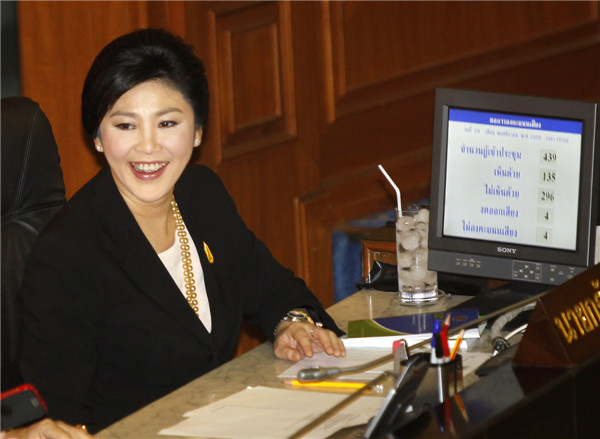 |
|
Thailand's Prime Minister Yingluck Shinawatra smiles during a no-confidence vote in Bangkok November 28, 2013. [Photo/Agencies] |
The vote, however, is unlikely to defuse tensions or end the biggest anti-government protests since deadly political unrest three years ago. Protesters plan to march to the national police headquarters and defense ministry on Thursday.
"I will not dissolve the house," a defiant Yingluck told reporters before the vote.
"It is clear the protesters are not looking for house dissolution so, starting today, let us find a way out this together," Yingluck said.
Yingluck needed more than half, or 246 votes, out of the 492 votes in the lower house to prevail. She won 297, with 134 votes against her.
Her Puea Thai Party and coalition partners dominate the lower house with 299 seats and comfortably survived the three-day debate during which the opposition grilled Yingluck on a 3.5 billion baht ($108 million) water management scheme and financially troubled government rice intervention scheme.
Protest leader Suthep Thaugsuban has ruled out talks with the government or other parties. "No more negotiations," Suthep told cheering crowds late on Wednesday after thousands massed outside four Thai government ministries, a major state office complex and 31 provincial halls.
ECONOMY AT RISK
The protests threaten to destabilise Thailand at a delicate time, just as its $366 billion economy, Southeast Asia's second biggest, is losing momentum. Data released on Wednesday showed exports fell 0.7 percent in October from a year before, worse than the 0.7 percent rise most economists had expected.
Waving multi-coloured flags, tooting on whistles and backing up traffic, the protesters appear intent on shutting Thailand's government. They have occupied the Finance Ministry since Monday but have failed to force their way into other ministries. Instead, they gather at the gates, causing staff to evacuate.
Responding to the crisis, Thailand's central bank unexpectedly cut interest rates by a quarter point at its policy-setting meeting on Wednesday.
The demonstrators, a motley collection aligned with Bangkok's royalist civilian and military elite, accuse Yingluck of being an illegitimate proxy for her billionaire brother, former Prime Minister Thaksin Shinawatra, a populist hero of the rural poor who was ousted in a 2006 military coup.
Most of the 31 provinces where demonstrators had massed are in the south, a traditional stronghold of the opposition Democrat Party, although four were in the north and northeast, where the Shinawatra family is hugely popular.
The aim of the rallies was to wipe out the "political machine of Thaksin", said Suthep, a former deputy prime minister under the military-backed government that was routed by Yingluck in a 2011 election.
|
|
|
|
|
|
|
|
